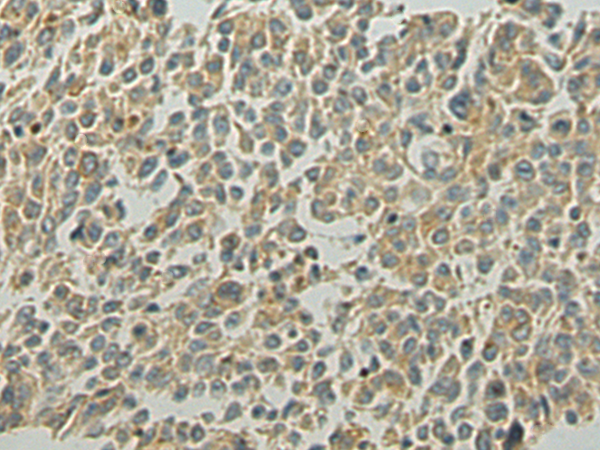
| WB | 咨询技术 | Human,Mouse,Rat |
| IF | 咨询技术 | Human,Mouse,Rat |
| IHC | 1/50-1/200 | Human,Mouse,Rat |
| ICC | 技术咨询 | Human,Mouse,Rat |
| FCM | 咨询技术 | Human,Mouse,Rat |
| Elisa | 1/5000-1/10000 | Human,Mouse,Rat |
| Aliases | TLP; VAM6; hVam6p |
| Host/Isotype | Rabbit IgG |
| Antibody Type | Primary antibody |
| Storage | Store at 4°C short term. Aliquot and store at -20°C long term. Avoid freeze/thaw cycles. |
| Species Reactivity | Human |
| Immunogen | Fusion protein of human VPS39 |
| Formulation | Purified antibody in PBS with 0.05% sodium azide and 50% glycerol. |
+ +
以下是关于VPS39抗体的3篇文献概览,涵盖其在不同研究中的功能和应用:
1. **文献名称**:*VPS39 interacts with Tom40 to regulate mitochondrial homeostasis through the mitochondria-associated degradation pathway*
**作者**:Li X. et al.
**摘要**:该研究利用VPS39抗体进行免疫共沉淀和免疫荧光实验,发现VPS39通过与线粒体膜蛋白Tom40相互作用,参与线粒体质量控制的调控,为神经退行性疾病机制提供了新线索。
2. **文献名称**:*Loss of VPS39 disrupts lysosomal homeostasis and induces Parkinsonian-like neurodegeneration in C. elegans*
**作者**:Wang Y. et al.
**摘要**:研究通过VPS39抗体敲除实验,证明VPS39缺失导致溶酶体功能异常和α-突触核蛋白积累,提示其与帕金森病病理过程相关。
3. **文献名称**:*VPS39 upregulation promotes pancreatic cancer progression through activating mTORC1 signaling*
**作者**:Chen L. et al.
**摘要**:通过免疫组化(使用VPS39抗体)发现,VPS39在胰腺癌中高表达,并通过激活mTORC1通路促进肿瘤增殖和转移,提示其作为潜在治疗靶点。
这些研究均依赖VPS39抗体进行蛋白定位、互作分析和功能验证,涉及神经科学、癌症生物学等领域。若需更早文献或特定实验方法,可进一步补充关键词检索。
**Background of VPS39 Antibody**
VPS39. also known as vacuolar protein sorting 39. is a critical component of the HOPS (Homotypic fusion and vacuole Protein Sorting) complex, which regulates membrane fusion events in lysosomal and endosomal trafficking pathways. It plays a key role in tethering late endosomes/lysosomes, facilitating autophagosome-lysosome fusion, and maintaining cellular homeostasis. Dysregulation of VPS39 is linked to lysosomal storage disorders, neurodegenerative diseases, and cancer.
Antibodies targeting VPS39 are essential tools for studying its expression, localization, and function. These antibodies are commonly used in techniques like Western blotting, immunofluorescence, and immunoprecipitation to investigate VPS39’s role in autophagy, endocytic trafficking, and cellular stress responses. Specific VPS39 antibodies help identify changes in protein levels under pathological conditions or genetic manipulations (e.g., CRISPR/Cas9 knockout).
Commercial VPS39 antibodies are typically raised in hosts like rabbits or mice, validated for specificity using knockout controls or siRNA-mediated knockdown. Their applications extend to research on diseases such as Alzheimer’s, Parkinson’s, and metabolic disorders, where lysosomal dysfunction is implicated. Reliable VPS39 antibodies thus contribute to understanding cellular quality control mechanisms and developing therapeutic strategies targeting membrane trafficking pathways.
×